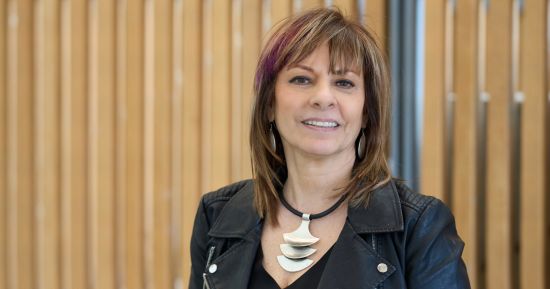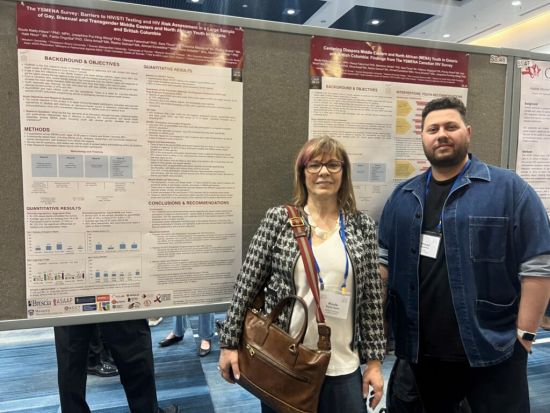Health sciences prof Roula Hawa runs mindfulness study to reduce HIV risks
Project builds connection, resilience for North African and Middle Eastern LGBTQIA+ communities
By Megan Stacey,
June 06, 2024

Health sciences professor Roula Hawa studies the resilience, sexual health, mental health and well-being of Middle Eastern and North African young adults in Canada. Her newest research project focuses on using mindfulness to reduce HIV risks. (Kim McCready/Faculty of Health Sciences)
A Western professor is launching a new mindfulness study as a tool to create connection, heighten resilience and lower high-risk activity within a population facing many new cases of HIV.
It’s a unique approach to health-care intervention, using weekly group programming to teach mindfulness techniques, and at the same time, build a community.
“We’re trying to increase the awareness, self-compassion and resilience at the individual and broader group level. We’re hoping that mindfulness is accepted and liked by the community and becomes something important in their lives,” said Roula Hawa, professor of family studies and human development in Western’s Faculty of Health Sciences.
The Mindfulness Project is piloting the SMART (self-compassion, mindful acceptance and resilient transformation) approach. SMART uses structured mindfulness practices to promote sustainable behaviour change and resilience, Hawa said.
The approach also draws on psychological practices, such as acceptance and commitment therapy, and other interventions used to reduce HIV stigma, which apply principles such as empathy, collective empowerment, social justice and equity.

Health sciences professor Roula Hawa and peer research associate Ahmad Ezzeddine at the Canadian Conference on HIV/AIDS Research in London, Ont. in April 2024. (Submitted)
Each group is composed of 10 young adult participants from North Africa or the Middle East diaspora – specifically those who identify as transgender, gay, bi or men who have sex with men – who meet virtually to learn about mindfulness and health. The project, which launched on May 25, runs twice a week for eight weeks. In total, there are 40 participants in the study, which will wrap up in 2025.
The Middle East and North Africa region has seen a 61 per cent increase in new HIV infections from 2010 to 2022, the highest regional rate of increase in the world. With the influx of refugees and new immigrants from the region to Canada, these statistics have significant implications for the country, Hawa said.
Funded by the Canadian Institutes of Health Research (CIHR)’s Canadian HIV Trials Network, known as the CTN, the ultimate goal of the study is to reduce high-risk contexts, using mindfulness training sessions to fill needs not being met elsewhere in the health-care system.
It’s a culturally sensitive program to boost knowledge and self-confidence.
“More and more people are using mindfulness, but it’s not a mainstream practice among the Arabic- and Farsi-speaking participants and communities,” Hawa said.
“People don’t necessarily have the training on how being mindful of your surroundings can help reduce the impact of unexpected events and risky situations in your life. We are hoping to improve participants’ mental health, resilience, self-compassion, and collective empowerment, which will hopefully reduce involvement in risky sexual contexts,” she added.
Participants gain support, sense of safety
Ahmad Ezzeddine is a participant and peer research associate with Hawa. He deals with anxiety and hopes to see an improvement in his mental health through the study period.
“This is really important to me, the psychological resilience I’ll be enhancing. Social support, connecting with others – I believe this will create a supportive network through a sense of community and shared understanding.” – Ahmad Ezzeddine, participant and peer research associate
Many of the participants are newcomers facing challenges associated with adjusting to a new home, often navigating job searches and sometimes facing trauma.
There is self-directed online learning on sexually transmitted infections, medications and other HIV-related information to complete between the virtual group sessions, which run for eight weeks.
The study is in the early stages, but already there is a growing sense of belonging, Ezzeddine said.
“We identify as part of the queer community, we all come with our taboos and stigmas. That’s why I think the mindfulness – focus on your breathing, your state of mind – is so powerful,” he said. “I felt a sense of comfort, relaxation and safety after that.”
Tackling stigma – and making an impact
Ezzeddine also sees the big picture that comes with joining a research project.
“I want to see a larger social benefit; I feel confident my participation – and the participation of others – will be valuable. If it works out, at the end of the intervention, we can pitch for better social services that will be reflective of this work,” Ezzeddine said.
“It’s important. If we’re going to create an organizational ask – arguing we need a tailored program that is culturally relevant – we need to back it up with some data and experience.”
Having a program that specifically targets the needs of North African and Middle Eastern people is crucial, Ezzeddine said.
“There are always gaps in the health-care system, but there are also systemic barriers. We are a racialized community – there is a lot of shame, a lot of stigma discussing sexual health,” he said. “That means people sometimes don’t know about testing. That’s striking.”
He gave credit to Hawa, who began researching HIV and sexually transmitted infection prevention in other communities in 2016.
Hawa is hopeful the newest study – part of her larger research program on the health and well-being of diaspora Middle Eastern and North African young adults in Canada – will show positive impacts of mindfulness training. When using similar mindfulness approaches with Chinese, African, Carribean and Black, South Asian, and Latinx communities, she’s seen participants spread their knowledge to those outside research circles.
“Because people enjoy the mindfulness and sense of community, they meet on their own and try to apply some of the practices they have learned. They create their own interventions,” she said.
“We are hoping people will champion it.”
ABOUT WESTERN
Western University delivers an academic experience second to none. Since 1878, The Western Experience has combined academic excellence with life-long opportunities for intellectual, social and cultural growth in order to better serve our communities. Our research excellence expands knowledge and drives discovery with real-world application. Western attracts individuals with a broad worldview, seeking to study, influence and lead in the international community.
CONTACT:
Marcia Steyaert
Executive Director, Editorial Strategy & Media Relations
Western Communications
Western University
Westminster Hall, Ste. 360
London, ON, Canada
e. steyaert@uwo.ca
t. 519.661.2111, ext. 85467
m. 226-927-3473
w. www.westernu.ca
Source: Western News
https://news.westernu.ca/2024/06/mindfulness-hiv-risks/
"Reproduced with permission - Western University "
Western University
For more HIV and AIDS News visit...
Positively Positive - Living with HIV/AIDS:
HIV/AIDS News
|